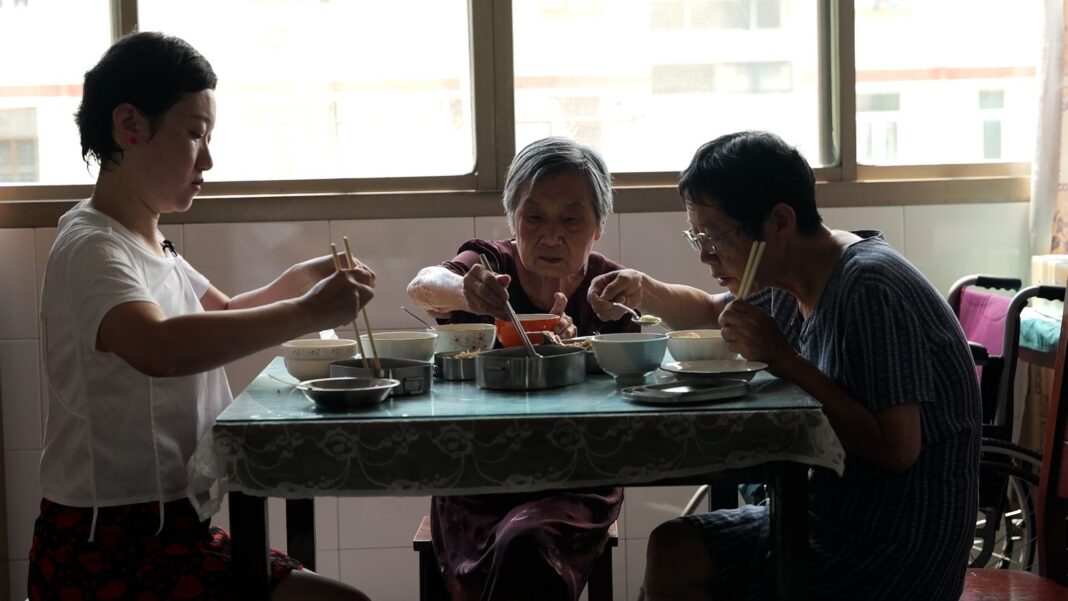On the outskirts of Beijing, 60-year-old Yao Pei jiu is lifted by care workers from his bed into a portable plastic bath.
He looks relaxed and calm.
“How good is it to bathe!” Mr Yao exclaims.
As the population of seniors grows in China, demand for home bathing services carried out by carers is booming.
Analysts predict there will be 500 million people over the age of 60 in China by 2050.
Mr Yao’s daughter, Yao Yuan nu says the government needs to do more to help families like her own.
Yao Pei jiu being bathed at his home in Beijing
“It feels like China is ageing all of a sudden, but supporting services are minuscule,” Mrs Yao says.
“How do I work and take care of my father, and my child at the same time?”

The Yao family
China’s pension pot
China is facing a looming demographic disaster. It has too many old people and not enough young workers.
It’s a legacy of the country’s one child policy, when most urban families were only allowed to have one child between 1980-2015. Since the policy was lifted, China’s birth rate has remained low.
A birth rate of 2.1 is needed to sustain a population – China’s is now approaching 1, according to government statistics.
While younger people cite high house prices, job insecurity and the economy as reasons for not starting a family.
The growing population of the elderly is putting pressure on the state pension scheme.
The Chinese Academy of Social Sciences estimates it could run out of money by 2035.
Official figures show China has nearly 300 million citizens aged 60 or above.
The number is expected to top 400 million by 2033 and approach 500 million around 2050, according to state news agency Xinhua.

Yao Pei jiu being bathed at home by care workers
Now China is making moves to overhaul the pension scheme, suggesting in a recent government paper the retirement age will be increased.
It says it will do this in a “gradual” and “voluntary” way.
While the language is vague, the message is clear that millions of Chinese people need to prepare ahead as the days of early retirement could be numbered.
Compared with Western countries, people in China stop working while they are relatively young.
It is as low as 50 for women and 60 for men.
But on China’s social media platform Weibo, there has been strong opposition to the idea of delaying retirement.
Read more from Sky News:
Life as an IS sex slave
Israel soldiers appear to sexually abuse Palestinian
Japan issues first ever ‘megaquake’ warning
One person posted: “It’s worse than assisted dying.”
Another wrote: “Delayed retirement AND lowered interest rates [of savings], do we post-95s make the heavens cross? Do we not deserve to live?!”
Growing old in Shanghai
In Shanghai, 91-year-old Jin Lianrong still lives at home with a carer.
She rarely tackles the four flights of stairs but is otherwise comfortable and mobile.
“Our children take care of us, just a call from me [and] they will come round in less than 10 minutes,” Mrs Jin says.
“Going to a care home is also an option, we have a pension.”
Shanghai is already offering support services for the elderly.
We visit a community canteen providing affordable food for seniors.
Jin Lianrong’s retired daughter, Jiang Jinzhu, comes here every day.

Jiang Jinzhu, a retired teacher, at a community canteen in Shanghai
At lunch, there are three generations of the family together enjoying a hearty meal.
Mrs Jiang thinks the time has come to delay the retirement age.
“By international standards, China’s original retirement age is relatively early,” she says.
“I was a teacher and I retired at 55, but a few classmates of mine who live in the US won’t retire until they are 67 years old.”
Sara Huang is a freelance writer and she has no plans to retire early.
“I’m imagining that some people would feel disappointed and frustrated by this new policy. But I can also imagine other people saying – yeah!”, Miss Huang says laughing.

Three generations of one family – Sara Huang (left), her grandmother Jin Lianrong (centre), and her mother Jiang Jinzhu (right)

Sara Huang
The plight of migrant workers
There is one large group of people in China who have no chance of a comfortable retirement or a care home, they are workers from the countryside who’ve migrated to the city.
There are close to 300 million of them.
Early in the morning in Shanghai, dozens of workers gather on a street corner to try and find a temporary day job, most are gardeners.

Keep up with all the latest news from the UK and around the world by following Sky News
“There is no money if we retire,” Mr Zhou says. “We have to work as long as our health allows.
“We don’t have any pension. We are not in the system.”

Mr Zhou, a 60-year-old worker from the Anhui Province

A migrant worker in China
It’s the same story for 70-year-old Mrs Cao.
She is bent over collecting trash for a living.
“I don’t have money if I retire. I’m from the countryside and I have no pension,” she says.
In China children are raised to care for their parents.
Many of them are feeling over-burdened, while the government is playing catch-up to get elderly services quickly in place.







